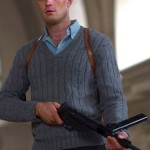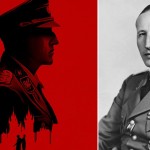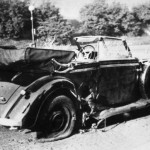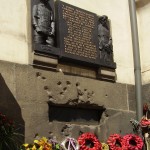The recent film by Sean Ellis again celebrates the heroic mission in which Czechoslovak paratroopers killed Reinhard Heydrich
 On the morning of May 27, 1943 Reinhard Heydrich, the de facto dictator of the Protectorate of Bohemia and Moravia, got into his usual Mercedes-Benz W142 convertible, alongside his driver, for his daily commute from the village of Panenské Břežany to Prague Castle. This time, however, a surprise awaiting him, would upset his daily routine. In the Libeň area, near Bulovka hospital, there was a sharp uphill turn in the road, forcing all cars to slow down. It was here where, once he received the signal, Corporal Jozef Gabčík suddenly leapt onto the street with a submachine gun in his hands, to shoot at the approaching Mercedes; but the machine gun got jammed. A second man, Corporal Jan Kubiš, who had been standing on the pavement, threw a hand grenade under the car of the general, blowing it slightly off the ground. The two fled, convinced they had failed in their objective.
On the morning of May 27, 1943 Reinhard Heydrich, the de facto dictator of the Protectorate of Bohemia and Moravia, got into his usual Mercedes-Benz W142 convertible, alongside his driver, for his daily commute from the village of Panenské Břežany to Prague Castle. This time, however, a surprise awaiting him, would upset his daily routine. In the Libeň area, near Bulovka hospital, there was a sharp uphill turn in the road, forcing all cars to slow down. It was here where, once he received the signal, Corporal Jozef Gabčík suddenly leapt onto the street with a submachine gun in his hands, to shoot at the approaching Mercedes; but the machine gun got jammed. A second man, Corporal Jan Kubiš, who had been standing on the pavement, threw a hand grenade under the car of the general, blowing it slightly off the ground. The two fled, convinced they had failed in their objective.
Nevertheless, the mission of the partisans, one planned by the exiled Czech government in London, the Czechoslovak Resistance, and the British government, still managed to cause the death of the “butcher of Prague”, who died in hospital eight days later, on the 4th of June 1942 of septicemia. The episode enraged Hitler, both due to the esteem he held in Heydrich, and the fact that the latter took a great risk by travelling around the city without an escort or a bulletproof car. The incredible story of Czechoslovak paratroopers, trained in the United Kingdom by the British Royal Air Force to assassinate the SS general, has already been the subject of various films that have depicted the mission, or the barbaric reprisals that followed.
The first, Hangmen Also Die (1943, United States) from the master of expressionism Fritz Lang, an Austrian who emigrated to the US, remains one of the most significant, even if it has little to do with the real history. The Austrian director wrote the screenplay just ten days after the attack, with German poet and playwright Bertolt Brecht, who like Lang fled Germany due to the rise of Nazism. If the events shown in the film correspond little with the real ones, this anti-Nazi piece stands out for the expressionistic touches in the stunning black and white photography of James Wong Howe, and Lang and Brecht’s skill in raising complex moral issues.
In the former Czechoslovakia, the most acclaimed dramatisation of the assassination is surely Atentát (1964), directed by Jiří Sequens. The film is considered the best work of the Brno-born filmmaker, who today is remembered as a gifted director, albeit one who compromised to make propaganda films for the communist regime. Sequens certainly made the most complete film on the operation, showing everything from the paratroop training in Britain, and highlighting their concerns about what the German reaction could be. The film won the Golden Prize at the Moscow International Film Festival in 1965, but unfortunately was seen very little outside the borders of the former Soviet bloc. Operation Anthropoid was also the theme of the American film Operation Daybreak (1975) directed by Lewis Gilbert, who has been at the helm of various Bond films. It is a film notable for the action scenes and the greater space dedicated to the character of Heydrich, but overall it does not bring anything new to the subject. Also Lidice (2011), from Alice Nellis, describes the aftermath of the assassination, and the brutal German reprisals, but despite its promise, the end result was a rather disappointing work with a decent performance from Karel Roden and a few moving moments, but little more.
 Anthropoid arrives in cinema theatres five years after the disappointment of Lidice, and was already a much discussed project in the country, during the filming in Prague, last year.
Anthropoid arrives in cinema theatres five years after the disappointment of Lidice, and was already a much discussed project in the country, during the filming in Prague, last year.
The US film, co-produced by the UK, France and the Czech Republic, boasts a cast of important international stars such as Irish actors Cillian Murphy and Jamie Dornan in the roles of Gabčík and Kubiš, but also familiar faces from Czech cinema including those of Anna Geislerová and Alena Mihulová. The producers (among whom also the Czech director David Ondříček) have stressed the efforts made to recreate the period, while the British director Sean Ellis carried out extensive research to give the film the greatest possible historical accuracy. The reception of the film at the Karlovy Vary festival in July was quite positive, but can we really consider it the most successful film representation of Operation Anthropoid?
The film retraces the historical episodes starting from the arrival of paratroopers Gabčík and Kubiš in the Protectorate, and their journey to Prague in order to get in touch with what remains of the Czechoslovak resistance to prepare the attack. If the first half of the film progresses slowly, the action is triggered in the scene of the assassination, a masterfully directed scene of high tension in which you genuinely sense the fear and doubt of the protagonists. Ellis manages to maintain the tension right up to the long final sequence, in which the Nazi troops besiege the cathedral of Saints Cyril and Methodius, the refuge of the partisans who had taken part in the operation. A finale with a strong sense of claustrophobia reminiscent of similar scenes in other classic war movies like Andrzej Wajda’s Kanał (1957), or Das Boot (1981). That said, it is a work that focuses primarily on the action scenes, and like most of the films on the theme, it maybe lacks an in-depth analysis of historical events. Ellis tries to bring to light the uncertainties of the resistance and Anthropoid group, however it would have been interesting to see the presence of the Czech government, who were coordinating the group’s activities from their place of exile in London. Although it has moments of great emotional power, it remains a work of variable tones with a sluggish first half, with feel one might expect from a BBC TV series.
All in all, Anthropoid deserves a viewing, but fails to offer ideas or interpretations that are not already present in the previous films on the mission. It is pleasing nevertheless, to see the story told on the big screen, in a large-scale production, but does not do enough to distinguish itself from films like Atentát. Besides, other works have managed to capture what is missing here, and recreate the atmosphere of terror that pervaded Prague following the killing of Reichsprotektor. An excellent example of the latter aspect would be Higher Principle (Vyšší princip), directed by Jiří Krejčík and released in 1959, which tells the story of three students in a high school in Prague, who are arrested and sentenced to death for having joked about Heydrich’s death.
However, those left unsatisfied with Anthropoid will only have to wait a few months for the next film on the assassination. The title will be HHhH, a French production, filmed in Prague and based on the book from Laurent Binet. The film will be already released in 2017 and promises to focus more on the figure of Heydrich. Just a short wait to see if this will be the definitive film on Operation Anthropoid.
by Lawrence Formisano








